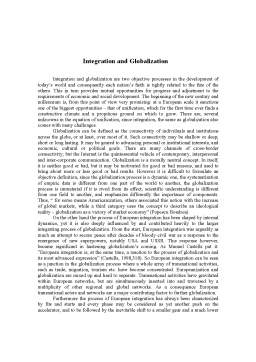Extras din referat
Integration and globalization are two objective processes in the development of today’s world and consequently each nation’s faith is tightly related to the fate of the others. This in turn provides mutual opportunities for progress and adjustment to the requirements of economic and social development. The beginning of the new century and millennium is, from this point of view very promising: at a European scale it sanctions one of the biggest opportunities – that of unification, which for the first time ever finds a constructive climate and a propitious ground on which to grow. There are, several unknowns in the equation of unification, since integration, the same as globalization also comes with many challenges.
Globalization can be defined as the connectivity of individuals and institutions across the globe, or at least, over most of it. Such connectivity may be shallow or deep; short or long lasting. It may be geared to advancing personal or institutional interests; and economic, cultural or political goals. There are many channels of cross-border connectivity; but the Internet is the quintessential vehicle of contemporary, interpersonal and inter-corporate communication. Globalization is a morally neutral concept. In itself, it is neither good or bad, but it may be motivated for good or bad reasons, and used to bring about more or less good or bad results. However it is difficult to formulate an objective definition, since the globalization process is a dynamic one, the systematization of empiric data is different from one part of the world to another, the globalization process is immaterial if it is rived from its effect, scientific understanding is different from one field to another, and emphasizes differently the importance of components. Thus, “ for some means Americanization, others associated this notion with the increase of global markets, while a third category uses the concept to describe an ideological reality – globalization as a victory of market economy” (Popescu Bondrea)
On the other hand the process of European integration has been shaped by internal dynamics, yet it is also deeply influenced by and contributed heavily to the larger integrating process of globalization. From the start, European integration was arguably as much an attempt to secure peace after decades of bloody civil war as a response to the emergence of new superpowers, notably USA and USSR. This response however, became significant in hastening globalization’s coming. As Manuel Castells put it: ”European integration is, at the same time, a reaction to the process of globalization and its most advanced expression” (Castells, 1998,318). So European integration can be seen as a junction in the globalization process where a whole array of transnational activities, such as trade, migration, tourism etc. have become concentrated. Europeanization and globalization are mixed up and hard to separate. Transnational activities have gravitated within European networks, but are simultaneously inserted into and traversed by a multiplicity of other regional and global networks. As a consequence European transnational actors and networks are a major contributing factor to further globalization.
Furthermore the process of European integration has always been characterized by fits and starts and every phase may be considered as yet another push on the accelerator, and to be followed by the inevitable shift to a smaller gear and a much lower speed. The early stages of European integration were mainly about the elimination of trade barriers, and this eventually brought about a, still incomplete, customs union in goods and the rapid growth of trade interdependence. So the period since the end of the Second World War has been characterized by a continuous and fast growths of world output. Services have become increasingly internationalized, following the explosion of transnational flows of capital and finance. National frontiers are now only one among many different factors influencing business decisions about the location of production. Time lags in the transfer of information and technology have been drastically reduced and people have been moving from one country to another in every increasing numbers.
As well as integration, the process of globalization has been making progress in the same direction. One of the most remarkable features of the last decade has been the rapidly growing trans-nationalization of most economies in the world. For example the share or combined inward and outward foreign direct investment stock for the world as a whole, rose from 14.2 percent in 1985 to an estimated 38.9 percent in 2000. Globalization, we like it or not, is a process that is undergoing now, bringing advances in organization of social and economic life, technology, democracy, international collaboration.
Furthermore, globalization is sustained mainly by economic processes, and this is also the plan chosen most often to project the consequences in term of wealth , quality of life. According to the paradigm of “man-purpose, economy-mean” effects of globalization could be divided in positive and negative. On the other hand globalization will facilitate migrations, with impacts on political decisions, national institutions and national values. The ecologic globalization is a topic discussed since 1972, when the first United Nation Conference was held in Stockholm. However, little progress was made due to scientific uncertainty, economic interest of fossil fuel owners, processors, and users, slow growth of alternative energy use etc.
Preview document
Conținut arhivă zip
- Integration and Globalization - Different Aproach.doc










